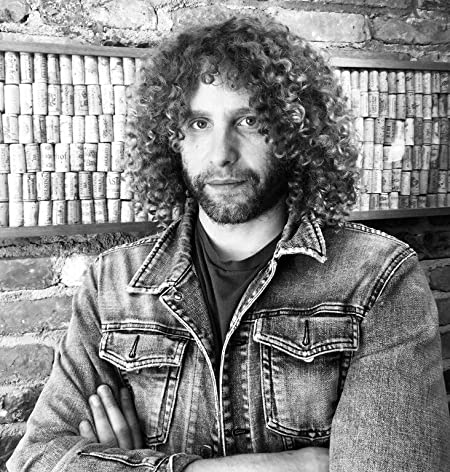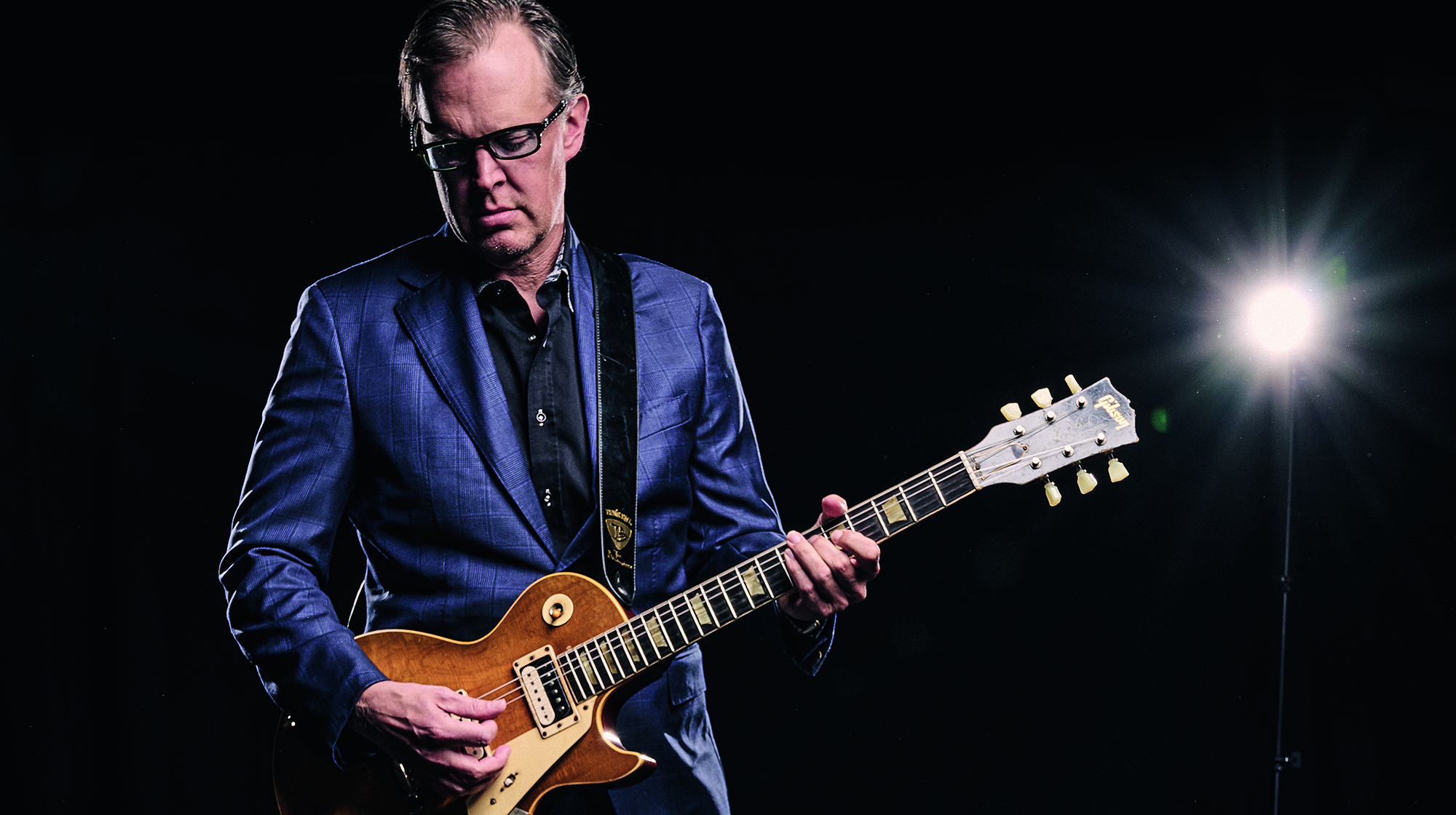Rivers Cuomo on the Biological Need to Shred, Heavy Metal, and Why Singing Your Solos First Makes For Good Phrasing
Rivers Cuomo lets the shred-obsessed kid inside him break free on 'Van Weezer,' a record that's half Blue Album, half '80s metal.
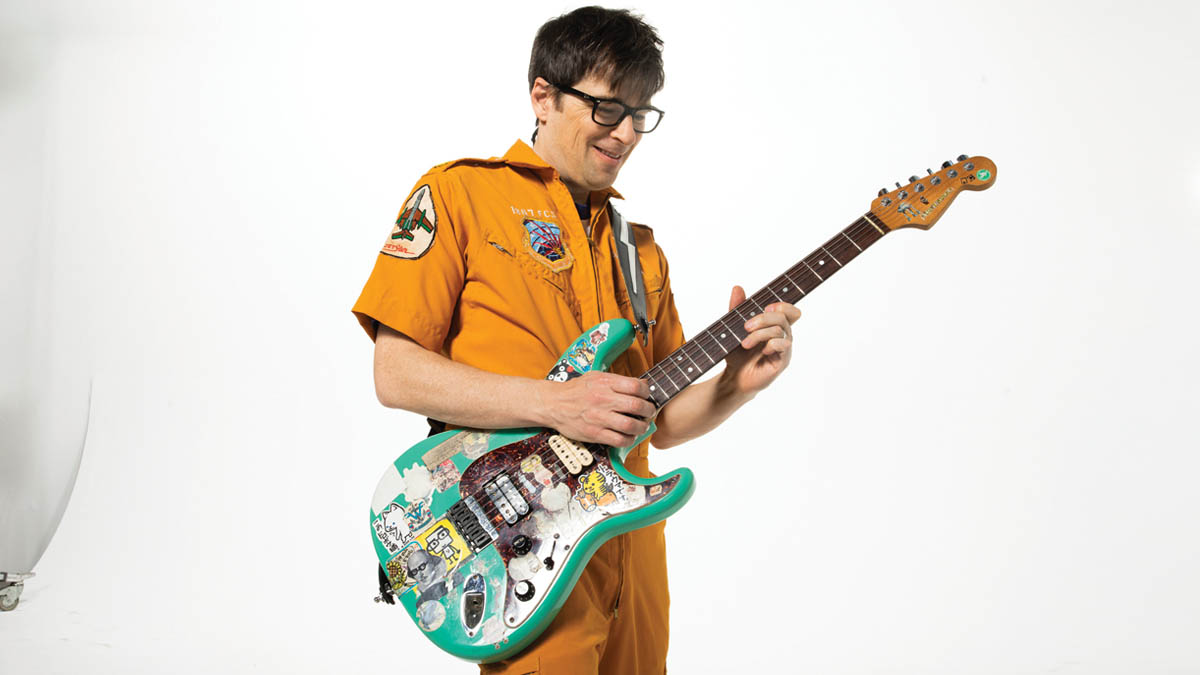
Since their earliest days as a band more than a quarter century ago, Weezer have been blurring the line between serious and humorous.
Their debut single, 1994’s “Undone – The Sweater Song,” was, as frontman Rivers Cuomo once said, “supposed to be a sad song, but everyone thinks it’s hilarious.”
Their most recent hit, meanwhile, was a faithful and wholly unironic (or was it?) reading of Toto’s enduring ’80s soft-rock touchstone, “Africa.”
Suffice to say then, casual Weezer fans who aren’t steeped in the group’s history might understandably misinterpret the intent behind the title of the group’s new and 15th studio album, Van Weezer (Atlantic/Crush).
Yes, it’s an obvious nod to hard-rock kingpins Van Halen. But even if the line from, say, “Hot for Teacher” to “Buddy Holly” isn’t immediately clear, the album’s name is hardly smirky posturing.
A few years ago, we began to feel like our audience wanted to see some serious shredding. If the audience responds to something, you start doing more of it
Far from it. Cuomo has always been vocal about his formative years as a shred-obsessed, hard rock-and-heavy-metal-loving teenager growing up in 1980s suburban Connecticut.
“At my core, I’m just cut from that cloth,” he tells Guitar Player. And as he recently discovered, a sizable portion of Weezer’s audience might actually worship at the shred alter as well.
“Historically, when Weezer have played a show, people are there to sing along to big choruses. There’s not too much guitar wizardry going on,” Cuomo acknowledges.
“But starting a few years ago, we began to feel like our audience wanted to see some serious shredding. If I happened to randomly start doing some two-handed tapping or something like that, the crowd would go absolutely nuts.
“And if the audience responds to something, you just start doing more of it and you let it evolve. So there started to be a lot more shredding going on at the shows, and that led to the idea to do this album.”
And so, roughly six months after the release of their 2019 studio effort, Weezer (the Black Album), the band – Cuomo, guitarist Brian Bell, bassist Scott Shriner, and drummer Patrick Wilson – unveiled the first single from Van Weezer, a power-pop anthem titled “The End of the Game.”
True to Cuomo’s words, it kicks off with some ’80s-evoking two-handed tapping (even if, the guitarist acknowledges, the inspiration for the shreddy lick was not Eddie Van Halen but rather Angus Young and his open-string pull-off motif in AC/DC’s “Thunderstruck”).
It’s called 'Van Weezer,' so it’s half ’80s metal and it’s half Weezer
Similar hard-rock references abound throughout Van Weezer, including the note-for-note cribbing of Randy Rhoads’ iconic riff from Ozzy Osbourne’s “Crazy Train” in “Blue Dream,” the fist-pumping solo that highlights “She Needs Me,” and the bombastic drum salvo that opens “I Need Some of That,” which is itself a note-perfect re-creation of the beat that kicks off Quiet Riot’s 1983 hesher anthem, “Metal Health (Bang Your Head).”
Despite all those retro signifiers, Cuomo emphasizes that the new album is no mere homage.
“It’s called Van Weezer,” he says, “so it’s half ’80s metal and it’s half Weezer. At no point did we want it to fully sound like one or the other. So there are moments where it sounds like straight-up Blue Album [Weezer’s 1994 debut], and then there are times where it’s like, ‘That sounds like Mötley Crüe!’ or “Oh my God, they’re totally doing a Poison guitar-chorus thing on that song!”
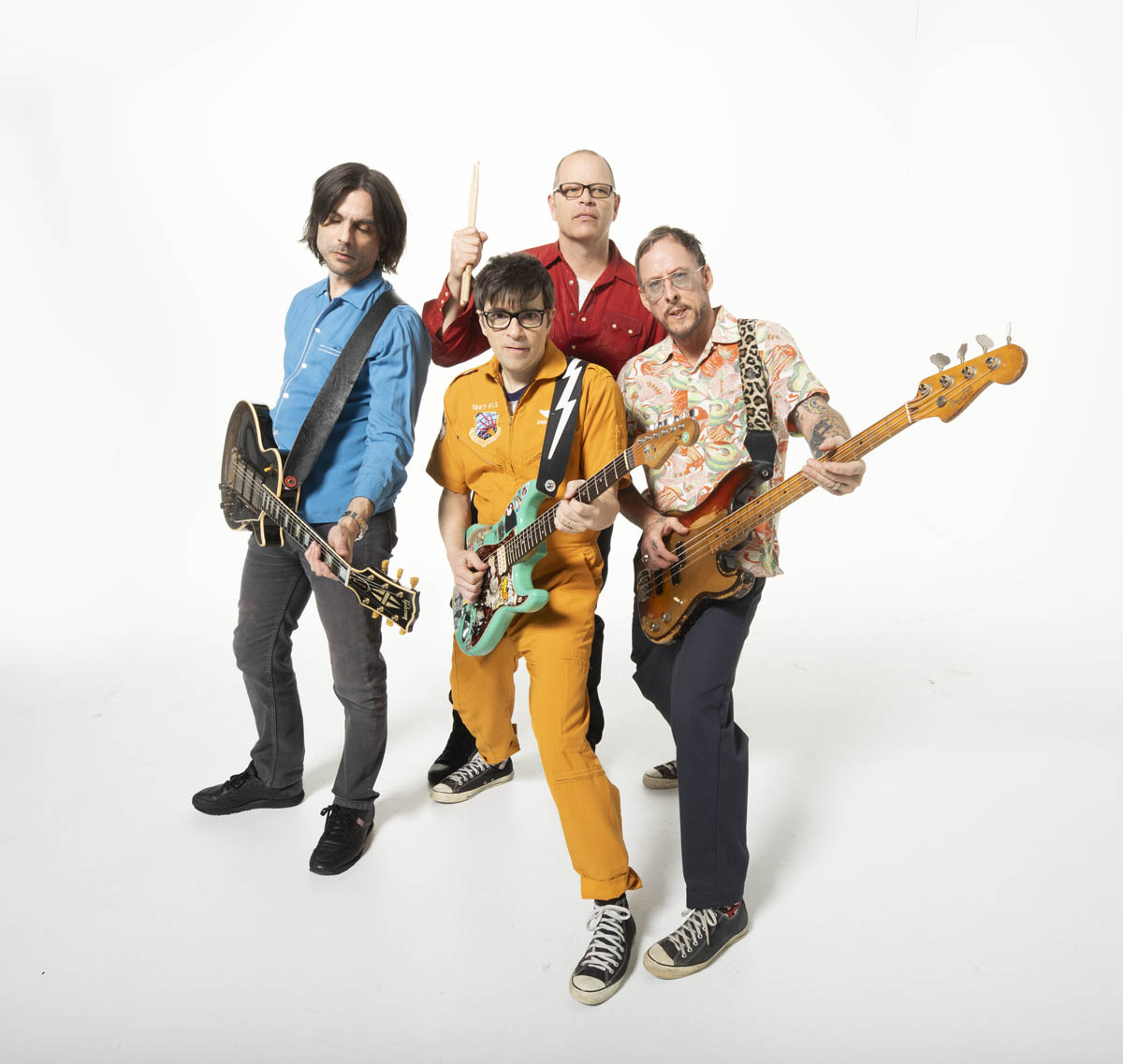
If this sort of unholy musical mashup sounds like your cup of tea, then by all means, read on. In the following wide-ranging interview, Cuomo talks about big riffs, hot licks, whammy-bar dive bombs, and his love for the Scorpions, Ratt, and Metallica, and tells how it all plays a role on Van Weezer.
The playing techniques and writing techniques have always been in my toolbox, but ever since the first Weezer record, I pretty much suppressed all of that
He also goes deep into his creative process, expounding on his techniques for writing music, lyrics, and solos – an assessment that, fair warning (to borrow another Van Halen–ism), is perhaps the only time you’ll hear Bon Jovi, Lady Gaga, and Igor Stravinsky mentioned in the same conversation.
Purely from a guitar-playing perspective, I would imagine Van Weezer was a pretty enjoyable album to make.
It was. I wanted to explore my metal roots and go back to making those kinds of records. The playing techniques and writing techniques have always been in my toolbox, but ever since the first Weezer record, I pretty much suppressed all of that.
So there are all these vintage tools I have that have never been used in public, and I decided to take them out and see what happens. I brushed up on my two-handed tapping and harmonics. We got custom guitars with whammy bars. We did all of it. I wanted to play with those techniques and sounds and equipment. And it was super fun.
I felt like there was a legitimate reason to shift my style away from ’80s metal, which stood for things that didn’t quite feel at the core of what I wanted to say to the world anymore
When it came to the techniques, did you have to woodshed in order to get your chops up to speed, so to speak? Or was it more like instant recall?
Well, I’ve been shredding more at our shows lately, so some of the technique came back through that process. But I didn’t pick up a guitar with a whammy bar until I was in the studio – it’d been probably decades since I had played one – and immediately all the technique came back. It was like riding a bicycle, as they say.
That said, there was a point where I was cutting one of the solos and I’m pretty sure Suzy [Shinn, Van Weezer's producer] said something like, “Do something like you used to do in Avant Garde or Zoom back in the day.” [In the late ’80s, Cuomo moved from Connecticut to L.A. with his metal band, Avant Garde. They later changed their name to Zoom.]
And I was like, “Okay, let me just go back on YouTube and check out one of our videos to see what I was doing.” So I went and watched one of the videos and I went, “Holy shit! I can’t play like that!”
“I was really good!”
[laughs] Yeah. It was pretty hilarious. It was like, “That’s insane!”
The first single released from Van Weezer, “The End of the Game,” puts a lot of that ’80s guitar technique right in the foreground. There’s the two-handed tapping, of course, but also some seriously chunky chord work and palm-muted pedal tones and arpeggios. It reminds me a bit of Ratt’s “Round and Round.”
Yeah. Which is itself maybe referencing Van Halen’s “Panama.” But that brings up a good point: Even though the album title is obviously referencing Van Halen, the point in time where I really became passionate about this musical genre was more the Ratt, Mötley Crüe, Quiet Riot, Iron Maiden, Judas Priest era, which is just right after Van Halen, I think. So yeah, a lot of the musical reference points are slightly later ’80s.
You say some of the techniques you employ on Van Weezer have been, for the most part, suppressed in Weezer. They especially were in the band’s early days, which was a time when alternative music was positioned as the antidote to ’80s-style hard rock and metal. Did you feel like you had to suppress it?
Yes, but it wasn’t just a crass desire to fit in and be successful. I felt like there was a legitimate reason to shift my style away from ’80s metal, which stood for things that didn’t quite feel at the core of what I wanted to say to the world anymore. There was a new message to get across, and that required a new set of techniques and actually a much smaller palette of techniques.
When I hear the crowd screaming for something, I’m just like, 'I gotta give ’em more!' I’m hardwired to do that
It’s interesting that you would choose to revisit those techniques now, at a time when, at least in the mainstream pop-rock world where Weezer resides, not only is that style of guitar playing not in fashion but the guitar itself is arguably not even much of a featured instrument any more.
[laughs] I know. It’s weird. It’s hard for me to make sense of the reality you see online, on Spotify or on any music chart anywhere, and then the reality of the 10,000 people in the arena at a Weezer show. They’re just alternate realities.
But the fact is that when I’m in the room with all those fans, it’s so primal and so visceral, and that’s really what guides me in my creative life. When I hear the crowd screaming for something, I’m just like, “I gotta give ’em more!” I’m hardwired to do that. It doesn’t matter what’s on Today’s Top Hits on Spotify, or whatever.
I recently spoke with Billie Joe Armstrong for this magazine, and he said the fact that your bands are playing stadiums together this summer demonstrates that rock is far from dead, even if these days it exists somewhat outside the mainstream.
That’s true. And I think it’s also true that different genres of music work better in different settings. Like, mumble rap sounds really great on noise-canceling high-definition headphones.
But then if you get into a stadium and you’re trying to mumble rap, either no one can really understand what you’re doing or you have to yell your top line instead of mumbling it, and it’s just a different thing. Whereas rock music is designed to rock stadiums and arenas.
Van Weezer seems particularly made to rock stadiums. Was the knowledge of the tour with Green Day a consideration when it came to doing this record?
Yes, absolutely. We were actually working on another record with piano and strings called OK Human, which we’re about 75 percent done with [the album was released in January 2021], and we were going to do Van Weezer after that. But when the tour came along, we thought, Well, if we’re going to play stadiums with these big rock bands, why are we putting out an album that’s all orchestra and piano and has no guitars on it?
So instead we made a full-on metal record. And afterward we’ll finish OK Human and go do a theater tour with an orchestra, or something like that.
I created big playlists of all these ’80s metal songs, and I made a searchable database in Google Sheets that I could filter by year, tempo, feel, key, song popularity, and genre
One interesting thing about Van Weezer is that, even though all these ’80s metal references abound, it still sounds like a Weezer album.
I’d say that shortly after starting the writing process, I realized that I wanted to separate the writing and the production, and that the writing would be very much traditional Weezer pop-rock songs rather than metal songs.
They were still going to be mostly major-chord progressions with fun singalong melodies and interesting lyrics. But then we would take those and reimagine them in the studio as metal songs. So the writing actually wasn’t different from what was done before.
As far as songwriting goes, you’ve talked in the past about having your own very particular compositional process that incorporates the use of playlists and spreadsheets.
Listening to reference points is a huge part of the producing process for me. So I created big playlists of all these ’80s metal songs, and I made a searchable database in Google Sheets that I could filter by year, tempo, feel, key, song popularity, and genre.
I could get very specific and say, like, “We have a song at 140 bpm. What songs like that came out between 1979 and 1989, and are tagged for the metal genre on Spotify?” And then Spotify would make up a playlist for me, and I could sit there and pick up some inspiration if I needed it.
Can you give some examples of that sort of inspiration on this record?
Well, for the new song “I Need Some of That,” I was listening to Bon Jovi’s “You Give Love a Bad Name.” And the opening drum riff is from “Metal Health” by Quiet Riot. And then “She Needs Me” – I don’t know if you can hear it but it’s a little more AC/DC than a regular Weezer song. We tried a bit of “You Shook Me All Night Long” on that one.
“Blue Dream” would be an example of a song where the inspiration seems very obvious.
Well, yeah. I mean, that one we’re just taking the “Crazy Train” riff and leaving it as is. So that’s like a different category of writing. To me, that’s like the equivalent of a sample. We’re not literally sampling audio, but we’re saying, “Let’s use this existing riff that everyone knows and wrap it around one of our songs and see what happens.”
But really, it’s all fair game. One thing that was really nice about making this record was I heard all this ’80s music with fresh ears, and there were songs and bands and even entire subgenres that suddenly I was listening to and really enjoying.
Whereas at 16 or 17, I would have been prejudiced against some of these bands or subgenres because they weren’t metal enough. But hearing them now, it was like, “Oh yeah, this is a great song. It’s totally fun to play this, and I get why it was so big.”
Another technique I used was to write a solo for a song on the piano and then go back and play it on the guitar. Those solos tend to be a little bit more melodic
'80s hard rock placed so much emphasis on the riff. In Weezer the riff is important as well, but when it comes to songwriting, what is the central focus for you? Is it the riff, the chorus, a lyric?
I always think of this quote from Lady Gaga where she says, “You should start with the chorus, because if you don’t have a great chorus you’re fucked.” I think that’s pretty true.
So I don’t know that we always succeed, but that’s definitely goal number one. You’ve got to have a chorus. And once I get that, I stockpile lots of ideas so I can try out a couple different riffs and see which one seems to complement it best.
Often when artists talk about songwriting, they suggest there’s at least some element of divine inspiration at play, as if a song or riff was beamed down from the heavens and out through their fingertips. But you’re clearly open about the fact that, on some level at least, there’s an academic or organizational process involved.
Well, Igor Stravinsky wrote this great book called Poetics of Music, and in it he talks about how the kind of composer he respects is one that uses all the tools he has at his disposal, so he’s not just relying on some kind of pure, magical inspiration – he’s also making use of intellect and study and anything that makes his music as intricate as possible. I’ve always thought that was inspiring.
So whatever I can do to tweak a song and throw in a new and unexpected ingredient to make it more fun to listen to, I’m going to do it. It may seem like I have some unusual techniques, but honestly, the reality of the situation is that I’ve worked with a lot of different producers and writers and musicians, and everybody has their notebooks and their stockpiles and their tricks up their sleeves.
And nowadays they’re turning more and more to something on a hard drive or in a spreadsheet or in a note in their phones. So I would just say that, yes, I’ve been doing it for many years and I’m a very organized person and I like to track things and sort and filter, but essentially I think I have the same instinct that a lot of artists have.
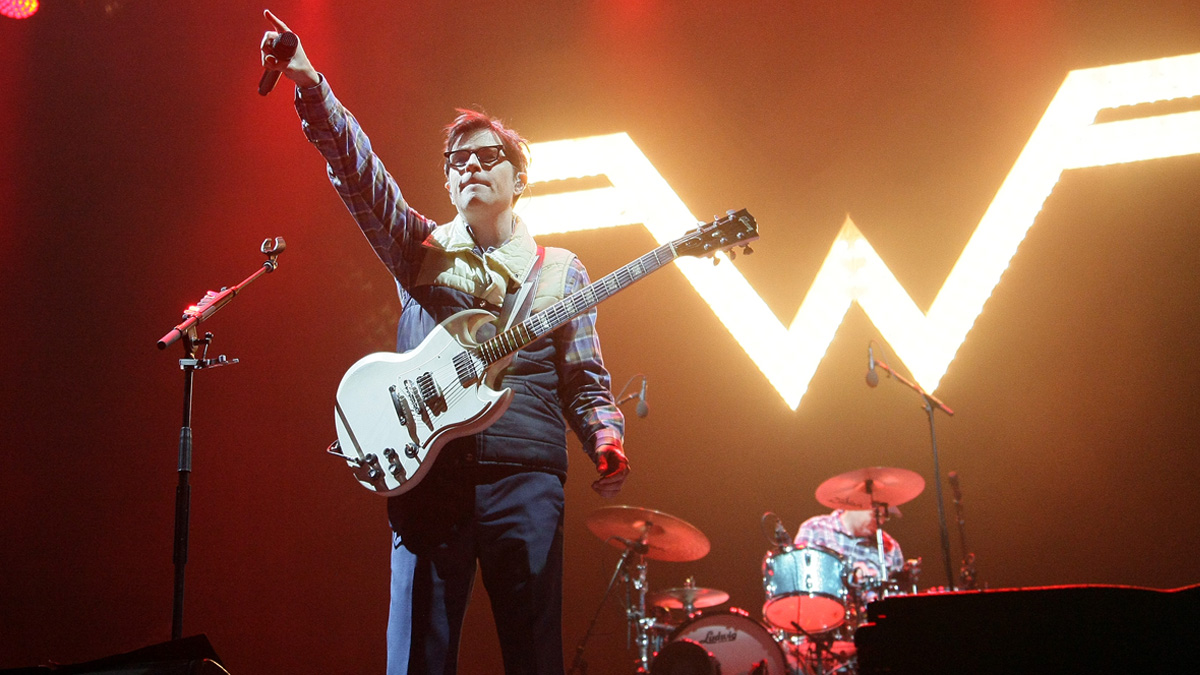
How about when it comes to solos? I’ve heard you say that you often sing your leads before you play them, which I imagine is a good way to break out of merely playing the usual licks and pentatonic runs.
Yeah. And I guess I had three main techniques that I used on the record when it came to solos. One was to just sing a solo with my mouth and then figure out how to play it a little more guitaristically. I don’t remember where I picked that up. It was a long time ago. It might’ve been in a book.
But I heard that if you compose like that, you automatically have decent phrasing because you run out of breath and you have to stop, whereas if you’re just shredding a guitar, sometimes you forget to stop. [laughs] Also, the solos tend to be much more catchy and memorable and less, like, headache-worthy.
Another technique I used was to write a solo for a song on the piano and then go back and play it on the guitar. And again, doing that just takes you out of whatever little box you’re in as a guitar player.
Those solos tend to be a little bit more melodic, and sometimes they can have a lot more implied counterpoint in them, too, because a piano is just such a contrapuntal instrument. Even within one voice, you can have a high part and a low part kind of talking to each other. I did that for the solo on “She Needs Me,” and I love to use that technique.
And then the third technique is that we would always make sure to do at least two or three passes where I would just shred away on a guitar with a whammy bar. Then we could go back and mix and match and take the best bits of each approach.
When it comes to your lead playing, I’ve heard you speak on a few occasions about the influence of the Scorpions. What was it about that band that appealed to you?
They just really struck a chord with me somehow, when I was 14 years old. I had grown up on Kiss, which is much more blues-based. But the Scorpions might have been the first hard rock or metal band I heard that was really coming more from classical chord progressions rather than blues-based rock progressions.
So I was hearing these harmonic minor scales and this more European classical tradition. I’m not sure why, but it really blew my mind. I think there’s just so much energy and excitement in those techniques.
Who else influenced you in those days?
Well, gosh, there’s so many. It all started with Ace [Frehley], and then the guys from the Scorpions and, after that, Yngwie Malmsteen. James Hetfield was a massive influence on my rhythm playing, and I liked all the neoclassical fusion guys like Cacophony and Paul Gilbert.
And I really loved this band from Connecticut called Fates Warning. They weren’t quite as technical, but they were progressive and musically sophisticated and emotional at the same time.
Were you one of those kids that would sit and play for hours on end and follow a strict practice regimen?
I would say I was. I’m not the most gifted self-disciplinarian, but I was at the very least a wannabe self-disciplinarian. So I had a metronome and I had a regimen of arpeggios and scales. And I put in a lot of hours.
I was very into learning and using my analytical mind, and I took theory classes in high school and went to a summer program at Berklee College of Music after my junior year. I know there were guys that were doing a little more than me and that were a little ahead of me, but I was going for it!
I think there’s probably something very, very deep, something biological about shredding
In the ’80s, there were so many kids obsessed with shred and that sort of advanced technique. What do you think it is about that style of playing that is, or was, so appealing to the American male teenage psyche?
Well, I don’t know that that’s the case anymore, but it certainly was the case back then. Even in my small home state of Connecticut, there were so many phenomenal musicians and so many incredible guitar players. It was really mind boggling.
But I don’t know. I think there’s probably something very, very deep, something biological about it. You’ve got all those hormones and all this potential and all this energy. And yet your status in the world is so low and you can’t get any attention, and so you just woodshed. I guess it’s like the male birds singing these beautiful songs. [laughs] You’re training yourself to do that.
Almost as if you can change your position in life by learning how to perform sweep arpeggios.
Yeah, yeah. I was certain of it! It was like, “Okay, if I can get this metronome speed up a little more, I’m going to be this massive rock star.” [laughs] But it doesn’t work that way.
And the irony, of course, is that you move out to L.A. and you realize that none of the record companies or anyone else in the world really cares that much about guitar solos, and they want to hear songs and lyrics and a message. So you have to retool your entire operation pretty quickly.
Earlier in the conversation, you mentioned that you have a more piano-based record, OK Human, on tap. What about after that? Have you gotten the shred-guitar stuff out of your system?
Well, ultimately I feel like Weezer is a collaboration between the four of us and the people in the audience. If they start going crazy for something, we kind of move in that direction, and if they start yawning or looking at their phones, then we just naturally stop doing it. It’s all negotiable.
So it’s been amazing to do this shred record, but I already have an idea for something else, which is like a very chill, happy record with tons of acoustic guitar, more like “Island in the Sun.” And OK Human, at the moment, it doesn’t have any guitar on it at all. It’s all orchestra and piano, and it’s going to be incredible.
But you know, anything can happen. If we put out Van Weezer and it’s just incredibly fun to tour on it and audiences are loving it, then maybe we go back and put a bunch of whammy bars on OK Human. Who knows?
All the latest guitar news, interviews, lessons, reviews, deals and more, direct to your inbox!
Rich is the co-author of the best-selling Nöthin' But a Good Time: The Uncensored History of the '80s Hard Rock Explosion. He is also a recording and performing musician, and a former editor of Guitar World magazine and executive editor of Guitar Aficionado magazine. He has authored several additional books, among them Kurt Cobain: Montage of Heck, the companion to the documentary of the same name.
